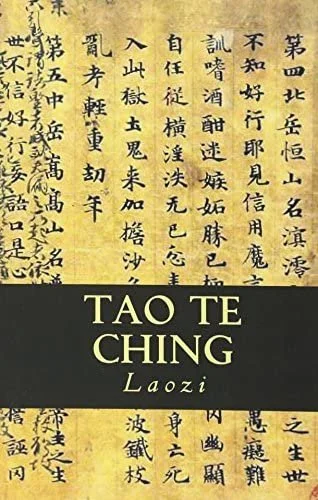
The Tao Te Ching (pronounced Dao De Jing) was a book of wisdom written for kings by a sage named Lao-Tzu, circa 500BC China. Much like the book of Proverbs found in the Biblical canon, the truths found in the Tao Te Ching are universal and timeless. But it's not just the east which was, and still is influenced by this great work. The Tao Te Ching resonates deeply with many of the Christian mystics as well, from antiquity to modern times. The Tao is not a religion. Its literal translation is The Way. A way of seeing, a way of being. In the Chinese translation of the New Testament, when Christ refers to "The Way," their word for it is The Tao. "Ritual and religion is the husk of true faith." These are one of the proverbs found in the book. So regardless of your religious background, or whether you believe in God or not, you will still find wonderful truths about life put into the simplest of words. Truths about leadership, patience, love and creativity. So share this link with those you love. It is a gift to the world, and we are lucky to be living in a time like this where such things can be shared. The world needs healing. The healing begins with the metanoia–the transformation of the mind.
You don't need to start with the beginning. You can literally play this from any point in the video and still gain something. I have a special liking for the second half which covers leadership and governance.
The Tao Te Ching is an ancient Chinese text, traditionally attributed to the sage Lao Tzu, that is considered a foundational text of Taoism. The text is a collection of 81 short verses that express the fundamental principles of the Taoist philosophy.
KEY TEACHING
The concept of the Tao: The Tao is the ultimate reality and the source of all things, and is characterized by its mystery, simplicity, and spontaneity. The Tao is said to be the ultimate principle of the universe, the ultimate reality that lies behind all phenomena, and the ultimate guide to living in harmony with the natural world.
The importance of non-action or wu-wei: The Tao Te Ching teaches that true understanding and harmony with the Tao is achieved through non-action or wu-wei. This means letting go of control and allowing things to happen naturally, rather than trying to force or manipulate events.
The concept of yin and yang: The Tao Te Ching teaches that the universe is made up of two opposing forces, yin and yang, which are in a constant state of interaction and balance. Yin represents the feminine, passive, and dark aspects of life, while yang represents the masculine, active, and light aspects.
The concept of the "ten thousand things": The Tao Te Ching teaches that the Tao is present in all things, and that everything is interconnected and interdependent. This concept is often referred to as the "ten thousand things," which is used to represent the infinite variety and complexity of the natural world.
The concept of humility: The Tao Te Ching teaches that true wisdom and understanding of the Tao comes from humility and the willingness to let go of the ego. This is opposed to trying to control or manipulate the world.
The concept of naturalness: The Tao Te Ching teaches that living in harmony with the Tao requires living in a natural and spontaneous way, instead of trying to impose one's will on the world.
The concept of simplicity: The Tao Te Ching teaches that the ultimate reality is simple and easy to understand, the ultimate truth is simple, and that the ultimate way of living is simple.
The importance of non-dualism: The Tao Te Ching teaches that the ultimate reality is non-dual, meaning that there is no separation between the self and the world, and that all things are interconnected and interdependent.

RUMI
Rumi was a 13th-century Persian poet, mystic, and theologian, known for his spiritual poetry and teachings on love, devotion, and the path to enlightenment.
He was born in 1207 in Balkh, in present-day Afghanistan, and later moved to Konya, in present-day Turkey, where he lived and wrote for most of his life. Rumi is considered one of the greatest poets in the Persian language and his works have been translated into many languages. He is best known for his spiritual poetry, which explores themes of love, devotion, and the path to enlightenment. Rumi's teachings are closely associated with the practice of Sufism, a mystical Islamic belief system that emphasizes the personal experience of God and spiritual growth through direct personal experience rather than religious doctrine. His works continue to be widely read and respected by people of all faiths, and have been popularized by contemporary spiritual teachers and writers.
Rumi's key teachings focus on the importance of love, devotion, the concept of "the Friend", the concept of "divine madness", the importance of music and dance, the importance
KEY TEACHING
The importance of love: Rumi believed that love is the ultimate path to enlightenment and that it is through love that we can connect with the divine.
The importance of devotion: Rumi taught that devotion to God is the key to spiritual growth and that it is through devotion that we can transcend the self and experience unity with the divine.
The concept of "the Friend": Rumi often used the metaphor of "the Friend" to refer to God, and taught that by connecting with the Friend, we can experience true joy and fulfillment in life.
The concept of the "divine madness": Rumi taught that true spiritual connection is a state of "divine madness" in which we let go of our ego and surrender to the divine.
The importance of music and dance: Rumi believed that music and dance are powerful tools for spiritual connection and that they can help us to transcend the self and experience unity with the divine.
The importance of the journey: Rumi taught that the spiritual journey is a lifelong process of self-discovery and that the destination is not as important as the journey itself.
The concept of the "whirling dervish": Rumi's teachings are closely associated with the practice of "sema" or the "whirling dervish," which is a form of physical meditation that involves spinning in a circle to achieve a state of spiritual ecstasy.
The concept of "detachment": Rumi believed that true spiritual growth requires detachment from the material world and the ego, and that by letting go of attachment, we can experience true freedom and liberation.

SAM HARRIS
Sam Harris is an American author, philosopher, and neuroscientist known for his books and lectures on topics such as the nature of consciousness, the relationship between science and spirituality, and the role of reason and rationality in understanding the world.
Sam Harris's key teachings focus on the nature of consciousness, the relationship between science and spirituality, the role of reason and rationality, the importance of ethics and morality, the concept of "moral realism", the importance of meditation, the concept of free will and the concept of determinism.
KEY TEACHINGS
The nature of consciousness: Harris is known for his research on the nature of consciousness and the relationship between the brain and the mind. He argues that consciousness is a product of the brain and that it can be studied and understood through scientific methods.
The relationship between science and spirituality: Harris argues that spirituality and science are not necessarily in opposition and that the two can be integrated to provide a deeper understanding of the nature of reality.
The role of reason and rationality: Harris believes that reason and rationality are essential for understanding the world and that we should use them to guide our beliefs and actions. He criticizes dogmatic and irrational thinking, and promotes critical thinking and evidence-based reasoning.
The importance of ethics and morality: Harris argues that ethics and morality are integral to human well-being and that they can be grounded in reason and science. He believes that ethical and moral principles can be derived from an understanding of the nature of consciousness and the well-being of sentient beings.
The concept of "moral realism": Harris argues that moral realism is the belief that certain actions are objectively right or wrong, independent of human opinions, and that this belief is based on scientific facts and logical reasoning.
The importance of meditation: Harris believes that meditation can be an effective tool for understanding the mind and that it can help individuals to achieve a state of inner peace and well-being.
The concept of free will: Harris argues that the concept of free will is an illusion, and that our actions are determined by the laws of physics, chemistry, and biology.
The concept of determinism: Harris is a proponent of determinism, the view that every event, including human cognition and behavior, decision, and action, is causally determined by an unbroken chain of prior occurrences.
#234 - THE DIVIDED MIND
A Conversation with Iain McGilchrist
#264 - Consciousness and Self
A Conversation with Anil Seth
#139 - The Edge of Humanity
A Conversation with Yuval Noah Harari
#96 - The Nature of Consciousness
A Conversation with Thomas Metzinger
#73 - Forbidden Knowledge
A Conversation with Charles Murray
#62 - What is True?
A Conversation with Jordan B. Peterson
#318 - Physics & Philosophy
A Conversation with Tim Maudlin
#250 - BROKEN CONVERSATIONS
A Conversation with Jesse Singal

ALLAN WATTS
Allan Watts was a British-American philosopher, writer, and speaker, known for his popularization and interpretation of Eastern philosophy for a Western audience. He wrote over 25 books and gave many lectures and talks on topics such as the nature of reality, the relationship between mind and body, and the relationship between humanity and nature.
Allan Watts was known for his popularization of Eastern philosophy and his teachings mainly focused on the nature of reality, the relationship between mind and body, the relationship between humanity and nature, the concept of Taoism, the importance of letting go of preconceptions and attachments and the concept of the "eternal now"
KEY TEACHINGS
The nature of reality: Watts believed that reality is not fixed or objective, but is instead a constantly changing and interconnected process. He taught that our perception of the world is shaped by our individual perspectives and experiences.
The relationship between mind and body: Watts believed that the mind and body are not separate entities, but are instead interconnected and interdependent. He taught that our thoughts and emotions have a direct impact on our physical health and well-being.
The relationship between humanity and nature: Watts believed that humanity is an integral part of nature, and that we are all connected in a web of life. He taught that a deep understanding of nature can lead to a greater understanding of the self and the world.
The concept of Taoism: Watts was deeply influenced by Taoist philosophy and often incorporated its teachings into his lectures and writing, such as the idea of going with the flow, living in the present moment and the concept of Wu Wei
The importance of letting go of preconceptions and attachments: Watts taught that true understanding and enlightenment come from letting go of fixed ideas and attachments, and being open to new perspectives and experiences.
The concept of the "eternal now": Watts taught that past and future are simply concepts in the mind and the true reality is the present moment.

RAM DASS
Ram Dass, also known as Richard Alpert, was an American spiritual teacher, psychologist, and author, known for his teachings on mindfulness, meditation, and the integration of spiritual practices into daily life.
Ram Dass's key teachings focus on mindfulness and meditation, service to others, love and compassion, the integration of spiritual practices into daily life, the concept of Bhakti Yoga, the concept of karma and law of cause and effect, the concept of non-duality and the importance of self-inquiry.
KEY TEACHINGS
Mindfulness and meditation: Ram Dass encouraged the practice of mindfulness and meditation as a way to develop self-awareness and cultivate inner peace.
Service to others: Ram Dass believed that service to others is an important aspect of spiritual growth and that by serving others, we connect with our higher selves.
Love and compassion: Ram Dass taught that love and compassion are essential for spiritual growth and that by cultivating these qualities within ourselves, we can create a more peaceful and harmonious world.
The integration of spiritual practices into daily life: Ram Dass believed that spiritual practices should be integrated into everyday life, rather than reserved for special occasions or specific settings. He taught that every moment is an opportunity for spiritual growth and self-discovery.
The concept of Bhakti Yoga: Ram Dass was deeply influenced by Bhakti Yoga, a path of devotion and the cultivation of love and devotion to the divine.
The concept of karma and the law of cause and effect: Ram Dass believed that our actions and thoughts have consequences and that by understanding this law, we can take responsibility for our lives and create positive change in the world.
The concept of non-duality: Ram Dass believed that the ultimate reality is non-dual, and that the separation between the self and the world is an illusion.
The importance of self-inquiry: Ram Dass taught that self-inquiry is an important aspect of spiritual growth, and that by understanding our own thoughts and emotions, we can understand the nature of reality.
Two conventional Harvard professors began probing the edges of consciousness in the '60s. Timothy Leary ended up in jail, while Richard Alpert became Ram Dass, a spiritual teacher.

Paramahansa Yogananda
Paramahansa Yogananda was an Indian spiritual teacher and guru who is known for introducing the teachings of Kriya Yoga to the Western world. He is the author of the spiritual classic "Autobiography of a Yogi," which has been widely read and continues to be influential today.
Yogananda's teachings focus on the spiritual path of Kriya Yoga, which is a form of yoga that emphasizes the use of specific techniques to control the breath and energy flow in the body in order to achieve a state of deep meditation and spiritual enlightenment. He taught that the ultimate goal of spiritual practice is to achieve a state of self-realization and union with the divine.
Yogananda also emphasized the importance of living a balanced and harmonious life, and encouraged his students to incorporate spiritual practices into their daily lives. He taught the importance of developing a strong and positive attitude, and the practice of self-observation, self-control and self-discipline, in order to achieve a balanced and harmonious state of inner peace and spiritual growth. He also taught the importance of service to others as a way to advance in one's spiritual journey.
In summary, Yogananda's teachings focus on the spiritual path of Kriya Yoga, with the ultimate goal of achieving self-realization and union with the divine, the importance of incorporating spiritual practices in daily life, developing positive attitude, self-observation, self-control and self-discipline for inner peace and spiritual growth and the importance of service to others in the spiritual journey.
KEY TEACHINGS
The spiritual path of Kriya Yoga and its emphasis on controlling the breath and energy flow to achieve deep meditation and spiritual enlightenment.
The ultimate goal of spiritual practice is self-realization and union with the divine.
The importance of living a balanced and harmonious life, incorporating spiritual practices into daily routine
The importance of developing a strong and positive attitude.
The practice of self-observation, self-control and self-discipline for inner peace and spiritual growth.
The importance of service to others in the spiritual journey.
The concept of karma and the law of cause and effect in one's actions.
The importance of developing a strong connection to the inner self through meditation and spiritual practices.
The value of studying and understanding the teachings of past spiritual masters.
The importance of a spiritual teacher or guru in guiding one's spiritual journey.

CARL JUNG
Carl Jung was a Swiss psychiatrist and psychoanalyst who founded analytical psychology. He is known for his theories on the human psyche, including the concept of the collective unconscious, archetypes, and the psyche's individuation process.
Jung believed that the human psyche is made up of three main parts: the conscious, the personal unconscious, and the collective unconscious. The conscious mind is the part of the psyche that is aware of the present moment and the personal unconscious is the part that contains memories and experiences that are not currently in conscious awareness. The collective unconscious is a deeper level of the psyche that contains archetypes, which are universal patterns and symbols that are common to all human cultures.
Jung also believed that the human psyche is constantly striving for balance and wholeness, which he called individuation. This process involves integrating the conscious and unconscious parts of the psyche, and becoming aware of and embracing the shadow, which is the darker, repressed aspects of the self. Jung also believed in the concept of synchronicity, which is the idea that events that seem to be coincidental are actually meaningful and connected.
Jung's teachings also include the concept of the anima and animus, which are the feminine and masculine aspects of the psyche respectively. He believed that each individual has both feminine and masculine elements within them, and that the psyche tries to balance these elements through relationships and experiences.
In short, Jung's teachings focus on understanding the human psyche, the process of individuation and the integration of the conscious and unconscious self through the use of archetypes, symbols and the concept of the collective unconscious, and the balance of the feminime and masculine aspect of the self.
KEY TEACHINGS
Here’s a list of Carl Jung’s key teachings:
The concept of the collective unconscious and archetypes.
The psyche's individuation process and the integration of the conscious and unconscious self.
The concept of the shadow, which represents the darker, repressed aspects of the self.
The idea of synchronicity and the interconnectedness of seemingly coincidental events.
The concept of the anima and animus, representing the feminine and masculine aspects of the psyche.
The importance of understanding and embracing one's own unique personality and individuality.
The value of dreams and their symbolic meaning in understanding the psyche.
The importance of mythology, religion, and other cultural symbols in understanding the psyche.
The idea that the psyche is constantly seeking balance and wholeness.
The concept of the self, which is the center and ultimate goal of individuation process.
Professor Jung is interviewed at his home in Switzerland by John Freeman. Theme music: excerpt from Les Francs-Juges by Berlioz, 1825.

DAVID DEIDA
David Deida is a spiritual teacher and author known for his teachings on masculine and feminine energy and their role in relationships. He emphasizes the importance of understanding and integrating these energies in order to have fulfilling and authentic relationships. He also teaches about the concept of "spiritual intimacy," which involves connecting with others on a deep, spiritual level. Deida's teachings often focus on the balance between surrender and strength in both men and women, and the need to break free from societal norms and expectations in order to truly understand and embody one's own unique masculine and feminine energy.
KEY CONCEPTS
These are some of the key concepts David Deida explores:
Understanding and integrating masculine and feminine energy in relationships.
The importance of "spiritual intimacy" in connecting with others.
The balance between surrender and strength in both men and women.
Breaking free from societal norms and expectations to understand and embody one's unique masculine and feminine energy.
The importance of living authentically and in alignment with one's true nature.
The concept of "radical responsibility" for one's own growth and evolution.
The need for ongoing personal growth and self-discovery.
The importance of embracing vulnerability and emotional expression in relationships.
The value of spiritual practices such as meditation, yoga, and self-inquiry in achieving a deeper understanding of oneself.
The need for ongoing surrender to the present moment and a willingness to let go of attachment to outcomes.

CARL SAGAN
Carl Sagan was an American astronomer, astrophysicist, author, and science communicator, best known for his work in popularizing science and his contributions to the search for extraterrestrial life. Sagan co-wrote and hosted the groundbreaking television series "Cosmos: A Personal Voyage," which inspired millions of people worldwide to engage with scientific inquiry and explore the universe.
KEY CONCEPTS
The importance of scientific skepticism and critical thinking.
The vastness and beauty of the cosmos, and our place within it.
The value of exploring the universe and searching for extraterrestrial life.
The need for global cooperation in space exploration and scientific endeavors.
The potential dangers of nuclear war and the importance of disarmament.
The importance of preserving the environment and addressing climate change.
The significance of fostering a love for learning and curiosity.
The need for science education and literacy for all.
The importance of balancing the pursuit of knowledge with humility.
The idea that we are all "star stuff," made of the same elements as the universe, connecting us to the cosmos.

ECKHART TOLLE
Eckhart Tolle is a renowned spiritual teacher, author, and public speaker known for his teachings on the power of mindfulness and the present moment. He gained widespread recognition with the publication of his best-selling book, "The Power of Now," which emphasizes the importance of living in the present moment and transcending the ego-driven mind. Tolle's teachings draw from various spiritual traditions, including Buddhism, Hinduism, and Christianity, and focus on inner transformation and personal growth.
KEY TEACHINGS
Living in the present moment to overcome suffering and find inner peace.
Recognizing and detaching from the ego-driven mind to experience true self-awareness.
Cultivating stillness and silence to connect with the inner self.
Embracing acceptance and surrender in the face of life's challenges.
Practicing non-judgment and non-resistance to cultivate inner harmony.
Understanding the interconnectedness of all life and the oneness of existence.
Developing a compassionate and loving attitude towards oneself and others.
Balancing spiritual growth with engagement in the world and daily life.
Exploring the nature of consciousness and transcending the limitations of thought.
Utilizing mindfulness and meditation techniques to cultivate a deeper spiritual connection.
"Whatever you fight, you strengthen, and what you resist, persists."
"Realize deeply that the present moment is all you have. Make the NOW the primary focus of your life."
"Life is the dancer and you are the dance."
"Worry pretends to be necessary but serves no useful purpose."
"You are not your thoughts; you are the awareness behind them."
"The primary cause of unhappiness is never the situation but your thoughts about it."
"The power for creating a better future is contained in the present moment: You create a good future by creating a good present."
"Acknowledging the good that you already have in your life is the foundation for all abundance."

ABRAHAM HICKS
Esther Hicks (née Weaver, born March 5, 1948), often credited as Abraham Hicks.
Abraham Hicks is not an individual person, but rather a group consciousness channeled by Esther Hicks, an American motivational speaker and author. Along with her late husband Jerry Hicks, Esther introduced the teachings of Abraham in the late 1980s, focusing on the concept of the Law of Attraction and the power of positive thinking. The teachings of Abraham Hicks have gained a wide following and inspired numerous books, seminars, and workshops on personal development and self-empowerment.
KEY CONCEPTS
The Law of Attraction: like attracts like, and our thoughts create our reality.
The importance of maintaining a high vibrational frequency to attract desired experiences.
Focusing on positive thoughts and emotions to manifest goals and desires.
Cultivating an attitude of gratitude to attract more abundance and well-being.
The idea of deliberate creation: consciously choosing thoughts, feelings, and beliefs to shape reality.
The significance of emotional guidance to navigate life and make decisions.
The concept of vibrational alignment: aligning with the energy of one's desires to manifest them.
The importance of self-love and self-acceptance in the manifestation process.
Practicing meditation and visualization techniques to enhance manifestation and well-being.
Understanding that life is a constant journey of growth, expansion, and self-discovery.












